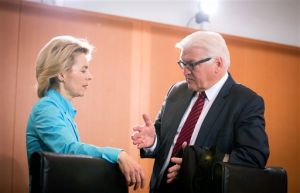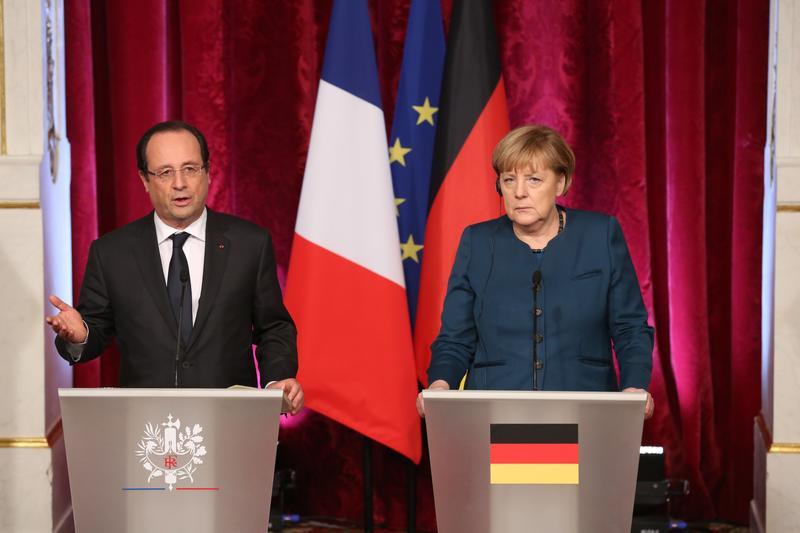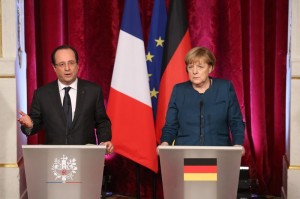Can Europe protect the Euromaidan?
February 3, 2014
German foreign policy perks up under new gov’t – Appeal
February 3, 2014In a joint declaration on January 21, Steinmeier and his French counterpart, Laurent Fabius, agreed to consult each other before EU summits, to travel together to “regions of particular interest to both countries and the EU,” and to cooperate on early crisis identification and prevention.
For their first joint trip, Steinmeier and Fabius intend to visit Moldova and Georgia, the two countries of the EU’s Eastern Partnership that are most interested in strengthening ties with the EU. A trip to West Africa is planned as well.
Good intentions are welcome but not enough; the Steinmeier-Fabius initiative needs to be backed up by substantial political will. There are incentives for closer Franco-German cooperation on foreign policy.
France feels overburdened with its military engagements in Africa, and Paris is eager to play a bigger role in the Arab world. That is becoming more urgent in an era in which the United States is trying to retreat from its regional leadership role. To sustain its engagement in sub-Saharan Africa and fill some of the vacuum that a disengaging United States leaves in North Africa and the Middle East, France needs the support of its European partners. Berlin is central for that support, because of Germany’s own resources and because it holds the key to turning French foreign policy ambition into a common European policy.
However, the challenge for France is to overcome its traditional unilateralism in foreign policy making and to Europeanize its approach. That means including European partners and the EU institutions at an early stage of policy planning and developing joint policies instead of going it alone first and pushing for support later.
For Germany, the desire to strengthen EU foreign policy is twofold. On the one hand, it is part of a package to restore close Franco-German relations. The recently elected coalition government in Berlin is trying to counter centrifugal tendencies in the EU, which grew stronger with the euro crisis. Germany sees reenergizing the rusty Franco-German engine of European integration as a way to move the bloc forward.
On the other hand, Steinmeier is genuinely interested in giving EU foreign policy a new boost. Germany is notorious for unilateralism too—especially in key commercial relationships such as that with China—but on many issues, Berlin is happy to keep a low profile and to delegate some of the burden of foreign policy making to Brussels.
The challenge for Germany, however, is to understand that a strong European foreign policy requires a strong German foreign policy as one of its building blocks. Germany’s task in the European context is to take a lead on developing strategies for Europe’s East: how to deal with the new geopolitical competition with Russia. It needs to do that together with the country that has become Germany’s other indispensable foreign policy partner, Poland.
At the moment, it is unclear whether Berlin will be able to rise to this challenge. On Russia and Eastern Europe, Germany is not speaking with a clear voice. Whether the Chancellery and foreign ministry are on the same page under the new leadership is an open question.
Steinmeier has pushed out the German government’s former Russia coordinator, Andreas Schockenhoff, who was an ally of Chancellor Angela Merkel and a critic of Russian President Vladimir Putin. However, Schockenhoff remains an influential lawmaker in Merkel’s center-right Christian Democratic Union.
The new Russia coordinator, Gernot Erler, was a close aide of Steinmeier’s during his first term as foreign minister between 2005 and 2009. Erler is well known for his view that close relations with the Kremlin are the West’s best and only hope of setting Russia on a path of modernization and liberalization.
If Steinmeier and Merkel cannot agree on Russia, Germany will not be able to take the lead on developing a new Eastern policy for the EU. There is high demand for such a policy after the Eastern Partnership’s disappointing summit in Vilnius last November and the reemergence of Russia as a strategic player in Eastern Europe and elsewhere.
Only if Germany does its homework and comes up with clear foreign policy strategies can it be a partner at eye level for France. Paris, despite its economic troubles, has a strong foreign policy identity and remains a major international player.
If Berlin overcomes the current cacophony and moves toward a new Eastern policy, in cooperation with Warsaw, Brussels, and other EU partners, it can become a strong partner for France on foreign policy. Under such conditions, a kind of grand foreign policy bargain would become possible: Germany would back French policies in the South, while France would support German-led efforts in the East. Such a deal, whose contours are visible in the French-German declaration, could, over time, become the centerpiece of a new European foreign policy worthy of the name.


